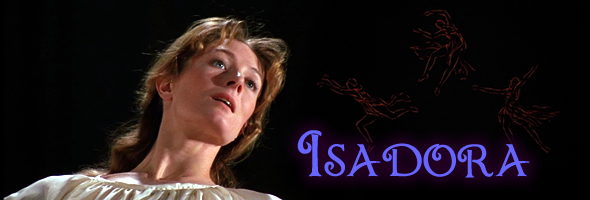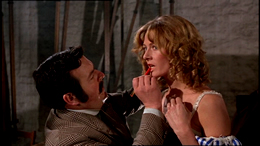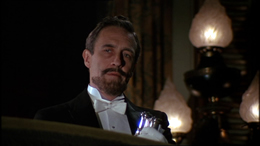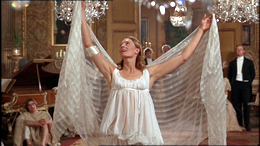
Color, 1968, 134m.
Directed by Karel Reisz
Starring Vanessa Redgrave, John Fraser, James Fox, Jason Robards, Ivan Tchenko
Odeon (DVD) (UK R2 PAL) / WS (1.78:1) (16:9)

Color, 1968, 134m.
Directed by Karel Reisz
Starring Vanessa Redgrave, John Fraser, James Fox, Jason Robards, Ivan Tchenko
Odeon (DVD) (UK R2 PAL) / WS (1.78:1) (16:9)
 The true story of the early twentieth century's most revolutionary female dancer, a bisexual communist who transformed ballet into modern dance, lost both her children in a freak drowning accident, and died under wildly macabre circumstnaces thanks to her fondness for flowing scarves, sounds so outrageous it should have been directed by Ken Russell. In fact it was, in 1966 as a BBC production called Isadora Duncan, the Biggest Dancer in the World in 1966, but it wasn't until two years later that the big screen got its own version of the dance legend's colorful life story. The unexpected choice of director for the film was Karel Reisz, the British New Wave filmmaker who rose to prominence with Saturday Night and Sunday Morning and had recently directed a gothic remake of Night Must Fall. However, his involvement was overshadowed by the force of his leading lady, Vanessa Redgrave, whose astonishing performance would have easily won an Oscar in any other year (she ended up losing to a tie between Katharine Hepburn and Barbra Streisand).
The true story of the early twentieth century's most revolutionary female dancer, a bisexual communist who transformed ballet into modern dance, lost both her children in a freak drowning accident, and died under wildly macabre circumstnaces thanks to her fondness for flowing scarves, sounds so outrageous it should have been directed by Ken Russell. In fact it was, in 1966 as a BBC production called Isadora Duncan, the Biggest Dancer in the World in 1966, but it wasn't until two years later that the big screen got its own version of the dance legend's colorful life story. The unexpected choice of director for the film was Karel Reisz, the British New Wave filmmaker who rose to prominence with Saturday Night and Sunday Morning and had recently directed a gothic remake of Night Must Fall. However, his involvement was overshadowed by the force of his leading lady, Vanessa Redgrave, whose astonishing performance would have easily won an Oscar in any other year (she ended up losing to a tie between Katharine Hepburn and Barbra Streisand).
Committed utterly to art, truth, and beauty, Isadora Duncan pledges her exclusively to these pursuits as a young girl when she burns her parents' marriage certificate in a ceremonial rite in her bedroom. From there her story bounces back and forth through time as the 49-year-old dancer writes her memoirs in Nice, with flashbacks showing her departure from America to the newly revolutionized Russia and her return back, her string of colorful lovers (including a nearly unrecognizable Jason Robards) across Europe.

An ambitious and often experimentally constructed film, Isadora had the extreme misfortune of opening in the late '60s designed as a roadshow production, a premium ticket item complete with an overture, intermission, and exit music, clocking in at nearly three hours. This version was rushed into a tiny handful of first-run venues at the end of 1968 to qualify for the Academy Awards, but a hostile review in Los Angeles caused Universal and producers Robert and Raymond Hakim (the men behind such illustrious productions as Belle de Jour and Purple Noon) to yank the film and reissue it in a bewildering number of versions. A general release edition running 134 minutes was shown as Isadora, while a shorter 128 minute version went wider under the title Loves of Isadora and retained that title for TV airings, which were hacked down to as little as 90 minutes. The film languished in obscurity afterwards for many years before Univeral allowed Reisz to construct a director's cut running 153 minutes for VHS release; this version wasn't intended for theatrical release and was apparently constructed on video as a one-inch master (with very, very pale image quality), so if anyone lucky enough to still have that tape should hold on to it carefully. Though the film found many rabid fans during its release (in fact, for a while it seemed like the love generation's answer to The Red Shoes and inspiration for a lot of young girls to take up dance), its history over the years seems like the whole production fell under some sort of odd cinematic jinx.
 As with most of its other titles from this era (the sorry fates of Games or Eye of the Cat are enough to make a movie fan weep), Isadora has never been a high priority for Universal who has essentially ignored it through the DVD generation. The roadshow version remains unreleased in any format (hopefully it isn't lost completely) while other maligned, late-period roadshow titles like Star! have been restored; one can only hope it will see the light of day at some point, but that will take more care and time than anyone seems willing to invest at the moment. In the meantime the film has at least been released at last on DVD in a very nice-looking edition from Odeon in the UK; it's infinitely superior to the VHS release, with beautifully vivid colors and more satisfying framing. The version used here is the general release cut of 134 minutes, which varies from the video director's cut in a number of respects; for example, in the DVD version the Universal logo suddenly appears after little Isadora's opening ritual, a wild touch that actually works really well. The mono audio sounds very clear and does justice to the powerful score by Maurice Jarre, which also incorporates a number of classical pieces as well as the standard "Bye Bye Blackbird" (a piece later referenced ironically in Ken Russell's The Devils, while Russell nudged Duncan again several times in his underrated film of The Boy Friend). The two-disc set includes some solid extras as well, starting with an 11-minute segment from the '60s British TV show Aquarius about the dancer's life. Also included on disc one are a stills gallery and the sole, extremely fleeting instance of Duncan preserved on film, alas largely obscured by a tree. Disc two features the entire 107-minute performance of Isadora, the Royal Ballet's production based around her dance style and the art nouveau movement which is often associated with her. For anyone curious about one of the late '60s' most inexplicably forgotten and audacious studio films, this is certainly a worthwhile introduction that will hopefully lead to enough interest to justify a full-scale restoration somewhere down the road.
As with most of its other titles from this era (the sorry fates of Games or Eye of the Cat are enough to make a movie fan weep), Isadora has never been a high priority for Universal who has essentially ignored it through the DVD generation. The roadshow version remains unreleased in any format (hopefully it isn't lost completely) while other maligned, late-period roadshow titles like Star! have been restored; one can only hope it will see the light of day at some point, but that will take more care and time than anyone seems willing to invest at the moment. In the meantime the film has at least been released at last on DVD in a very nice-looking edition from Odeon in the UK; it's infinitely superior to the VHS release, with beautifully vivid colors and more satisfying framing. The version used here is the general release cut of 134 minutes, which varies from the video director's cut in a number of respects; for example, in the DVD version the Universal logo suddenly appears after little Isadora's opening ritual, a wild touch that actually works really well. The mono audio sounds very clear and does justice to the powerful score by Maurice Jarre, which also incorporates a number of classical pieces as well as the standard "Bye Bye Blackbird" (a piece later referenced ironically in Ken Russell's The Devils, while Russell nudged Duncan again several times in his underrated film of The Boy Friend). The two-disc set includes some solid extras as well, starting with an 11-minute segment from the '60s British TV show Aquarius about the dancer's life. Also included on disc one are a stills gallery and the sole, extremely fleeting instance of Duncan preserved on film, alas largely obscured by a tree. Disc two features the entire 107-minute performance of Isadora, the Royal Ballet's production based around her dance style and the art nouveau movement which is often associated with her. For anyone curious about one of the late '60s' most inexplicably forgotten and audacious studio films, this is certainly a worthwhile introduction that will hopefully lead to enough interest to justify a full-scale restoration somewhere down the road.
![]()